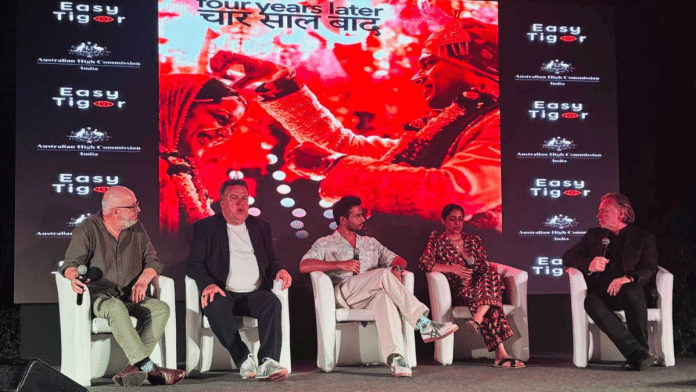Delhi: In a scene from the Australian-Indian series Four Years Later, a husband is shown to be unhappy when his sari-clad wife visits him at a hospital in a fictional town in Australia. He tells her she should not have come. What the scene captures is an immigrant’s struggle in a new country — trying to be less desi.
The new series, on the face of it, is a diaspora romance on the lines of Mira Nair’s adaptation of Jhumpa Lahiri’s The Namesake. It expands the scope to include the diversity of the migrant experience and mental health.
“Racism is addressed in the show, especially more for Yash at his workplace as a doctor. You cannot tell a story of immigration without talking about racism,” said actor Akshay Ajit Singh who plays the husband Yash.
He was part of a panel discussion that took place after a special screening organised by the Australian High Commission on 23 October at the High Commissioner’s residence lawns. Actor Shahana Goswami, who plays the wife Sri, and the show’s producers, Ian Collie and Stephen Corvini, were part of the discussion along with Australian High Commissioner to India Philip Green.
Four Years Later premiered on Australian broadcaster SBS on 2 October. It’s a reflection of the strengthening bonds between India and Australia in the entertainment sector. The International Film Festival of India (IFFI) on 23 October announced Australia as its Country of Focus for its upcoming 55th edition in Goa. Prior to that, last year, the two countries entered into an audio-visual co-production agreement.
“We are building a deep relationship between India and Australia by telling modern and contemporary stories. These stories bind us together and keep us close,” said Green.
Also read: Cuba beyond postcards. This photographer didn’t want to come back with just ‘travel pictures’
Two experiences
The eight-part series follows Sri and Yash as they reunite in Australia after being forced to spend four years apart. It was filmed in Jaipur, Mumbai, and Sydney.
“I would call it a big moment in terms of visibility of Indian content overseas. Specifically with India, we do not see a diverse representation,” said Goswami.
It’s the story of Yash and Sri as individuals and a married couple. It brings into focus Sri’s experiences—the kind of freedom in Australia that she could only yearn for in Jaipur.
The lead pair speaks in Indian English, with the show exploring the arranged marriage market, patriarchy, and how middle-class families mount their hopes and expectations on their sons. It is Yash’s father who urges him to travel abroad and complete his medical traineeship without his wife because she could become a ‘distraction’. In the meantime, Sri is taught how to cook and be an ideal Indian daughter-in-law.
She carries homemade food to Yash’s hospital in a quintessential steel tiffin box, a common sight in India. There are also undertones of the two having moved in different tangents in life, and the hint of Yash’s extramarital affair with a Syrian woman.
But she doesn’t face any racism—at least not in the two episodes that were screened. On the contrary, her husband works under supervisor Arun (Roy Joseph) who is unwilling to bond over their shared heritage. When he asks Arun about his hometown in India, the answer is a terse “Sydney.”
Yash experiences blatant racism from patients, primarily because of his accent, while Arun does not. Their experiences vastly differ even though they are in the same workplace and country. One character is a first-generation migrant, the other has a hyphenated identity.
India release
Four Years Later has received mostly positive reviews in Australia, and the producers are in talks to release the show in India via an OTT platform but are yet to sign on the dotted line.
“SBS is more a niche broadcast service. It does not have a huge audience, but through word-of-mouth, the show has made inroads. It’s been called the most bingeable Australian show this year,” said co-producer Collie. At the time of its making, he assumed that Four Years Later would be just “another multicultural show”.
“It is like the Squid Game. People need something new. We have not seen as many Indian Australians show,” said Collie.
The positive response has got Collie and Corvini thinking about more shows and characters with diverse backgrounds.
“This show gives confidence to broadcasters that we can have more diverse casting and stories,” said Corvini.
(Edited by Humra Laeeq)






